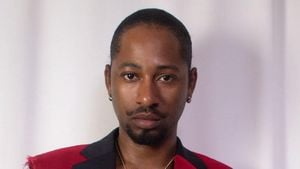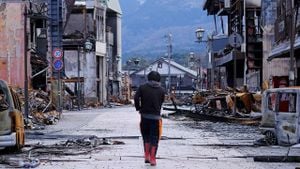The recent Conservative Political Action Conference (CPAC) held near Washington, D.C., became the controversial backdrop for an unexpected display of international political theater as South Korean conservative factions took to the stage. Attendees from the Korea Conservative Political Action Conference (KCPAC), led by Annie Chan, made bold allegations concerning electoral fraud back home, asserting without solid evidence its roots tied to the Chinese Communist Party. The conference is known for highlighting far-right agendas and policies and serves as the largest annual gathering for conservative political figures and activists.
On February 21, KCPAC set up booths at the CPAC venue, making elaborate claims of numerous fraudulent elections purportedly occurring within South Korea. They declared, "numerous fraudulent elections have happened," thereby capturing the attention of U.S. attendees. Their advocacy not only represented their organization's interests but also elicited reactions of confusion and skepticism from observers.
Their messaging followed closely at CPAC's main sessions, where various speakers reiterated the theme of alleged election misconduct. For example, Gordon Chang, an attorney and prominent commentator, stated, "Moon Jae-in was communist. The current leader of the Democratic Party is even more pro-communist than he was." Such declarations had the potential to amplify fears linking political instability with foreign intervention, echoing sentiments found within similar U.S. conspiracy narratives.
Simultaneously, Chang also asserted, "There will definitely be election fraud again, and the Chinese Communist Party will be behind it. South Korea is quickly becoming pro-China." This alarming rhetoric struck chords among certain attendees, some of whom were visibly taken aback during the presentations.
The KCPAC leaders, including scholars from prominent universities and U.S.-based organizations, have gained visibility and support within conservative circles. During the event, one of the speakers, Professor Choi Won-mok from Ewha Womans University’s law school, suggested, "It would be significant if President Trump publicly denounced election fraud and encouraged our efforts, validating our claims."
Echoing this sentiment, Fred Flights, the deputy director of the America First Policy Institute, added, "The election was stolen using Chinese equipment and software; it was rigged." Such comments reinforced connections between domestic unrest and broader geopolitical tensions, framing the narrative as part of larger struggles against perceived threats from China and North Korea.
KCPAC has strategically used such high-profile platforms for rallying support and disseminated its messaging more widely amid South Korea’s delicate political environment, particularly as President Yoon Suk-yeol faced impeachment proceedings. The connections made between international figures and the domestic far-right agendas seemed to resonate, indicating possible collaboration between Korean and U.S. conservatives.
Notably, the conference showcased other international conservative leaders, including Argentina's Javier Milei and Poland's Andrzej Duda. Their presence highlighted the solidarity and shared narratives among right-wing elements on global platforms, often using each other’s challenges and successes to embolden local movements.
Despite the grandstanding and declarations made at CPAC, reactions from the broader South Korean community have been skeptical. Critics expressed concern over the legitimacy of these claims and their impact on South Korean democracy. Kim Dong-seok, head of the Korean American Voting Coalition, cautioned, "Invoking U.S. political polarization and engaging them with our issues may deepen divisions among Korean-Americans, stressing the need for careful discourse on domestic matters without external influence."
Indeed, the KCPAC’s venture across the Pacific serves dual purposes: it raises awareness among American conservatives about alleged injustices occurring abroad, all the whilst isolatling and amplifying radical views back home. Yet this same approach inadvertently exposes them to scrutiny both nationally and internationally, with legislators and analysts questioning the validity of their narratives.
Meanwhile, the ability of the U.S. conservatives to sustain their narratives by weaving international narratives reinforces unproven claims made from expedient foundations. Historically, the CPAC platform has provided conservative figures with the audience range to amplify security concerns, often linking them to immigrants and foreign actors.
Conclusively, the intersection of South Korean conservative challenges with broader international dialogue at CPAC marks significant political theater—where fact and fiction can blur, engaging those open to radical reinterpretations of democracy and governance. The CPAC event, and particularly the involvement of KCPAC, underlines the growing influence of transnational ties among populists and extremists worldwide, challenging governments to rethink how they engage their ideological opposites.



